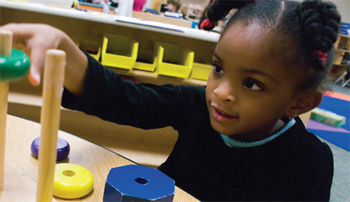Two premature babies. Two different paths. Sharan Bryson’s son, Chris, was born at 34 weeks old and weighed only four pounds, three ounces. Fifteen years later her daughter, Meah, was born at just 26 weeks. She weighed a mere two pounds, one ounce.
Premies are five to eight times more likely than babies born at term to need special education services for developmental or learning problems.
 |
Premie Meah Bryson was identified for speech therapy services at just 16 months thanks to TIPS. She has since graduated and now attends a Head Start program. |
Founded at the UNMC Munroe-Meyer Institute (MMI) in 1999, TIPS provides specialized, systematic developmental follow-up at 6, 16, 24 and 36 months for most babies who have been in a Neonatal Intensive Care Unit (NICU). It offers a more formal, in-depth screening than most physicians can provide and assesses overall developmental milestones.
“The goal is to gather information about how babies who have been in the NICU grow and develop in order to learn how to better meet their unique needs now and in the future,” said Barb Jackson, Ph.D., co-director of TIPS and director of education and child development at MMI. “If we can catch a problem at 6 or 16 months, we can implement early intervention as soon as possible.”
|
Before speech therapy, Meah wouldn’t mimic or even mumble speech sounds. Now 3, Meah’s able to share her wants and needs.
Meah graduated from special education services and now attends a Head Start program in Omaha where she continues to work on her communication skills.
“It’s amazing how far she’s come,” Bryson said. “I can really see the difference between her and her brother. There was a lot more support with her than with him.”